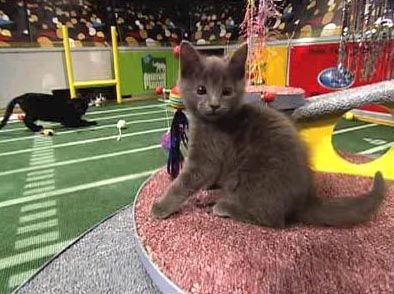So, it's Super Bowl Sunday - which for me does not involve watching men run around in pads and spandex, but instead I watch a different kind of bowl - Puppy Bowl on Animal Planet.
If you haven't ever tuned into Puppy Bowl, this year is the 4th year, it features hours of puppies playing and frolicking on a field that looks like a football stadium. And not to be outdone by the actual Super Bowl, it also has a kitty half-time show, that features playful kittens and confetti.

Watching the puppies this year got me thinking about the evolutionary significance of play and why are young animals so active. A quick Google search provided me with two good summary articles on this topic.
So what exactly is play in animals? According to John Byers and Marc Bekoff:
"Play is all motor activity performed postnatally that appears to be purposeless, in which motor patterns from other contexts may often be used in modified forms and altered temporal sequencing."Perhaps not a factor in domesticated animals like puppies, but playing takes valuable time and energy from developing young, so play must also serve some beneficial purpose for it to be present in a majority of mammals and some birds. It seems that animals are most active when their brains are developing most rapidly - stimulus via play helps create new neural connections. The energetic movements may also help muscle tissue mature.
Play also allows young to practice behaviors they will need as an adult. It seems there are 4 rough categories of play: locomotor play (juveniles moving in ways that mimic adult animal actions), predatory play (juveniles practicing hunting behaviors), object play, and social play (which can safely teach young the skills they will later use in aggressive social behaviors and may also strengthen social bonds between group members). Watching the puppies play tug of war, I can see how this mimics the action of ripping meat off bones. And it is always entertaining to watch kittens stalk and attack felt mice.
So, if you've missed the Puppy Bowl this year, no worries, Animal Planet has a few videos on their site that will tide you over until next year (you can always pretend you've taken an interest in animal behavior and are conducting "research").



No comments:
Post a Comment